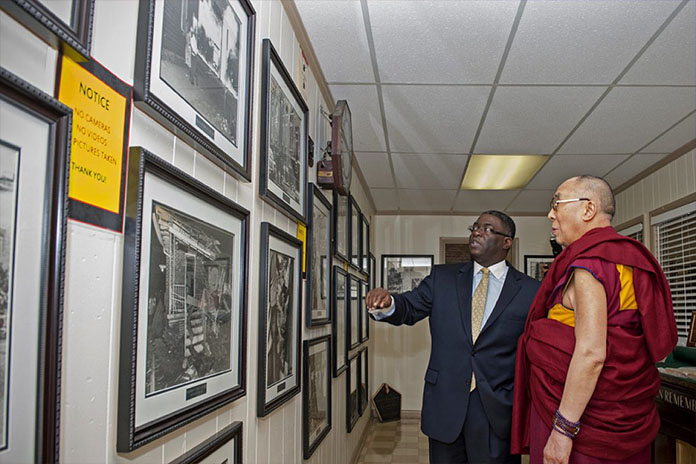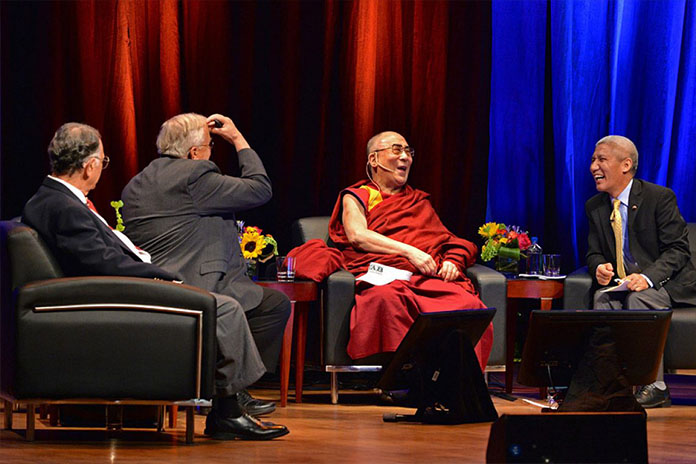
DURING his visit to the US for the Interfaith Discussion, the Dalai Lama offered words of wisdom, as he is wont to. Listed below are some of the Dalai Lama’s views as expressed during his visit.
1. On possibly being the last Dalai Lama:
“As early as 1969, I stated that whether the institution of the Dalai Lama should continue or not is up to the Tibetan people. That means, on my last day, if they feel that this six-century-old tradition is no longer relevant, then I am not concerned.
“Some people think the institution of the Dalai Lama is very important for Buddhism, but it is not. Buddhism is 2,500 years old. Buddhism in Tibet is about 1,300 years old. So the Dalai Lama tradition is only 500 to 600 years old.
“Sometimes, I’m rather critical of Tibetan practices, especially those that put too much emphasis on the Dalai Lama institution. That’s wrong. In India, there’s no such institution. There, through individual practice and study, a person can eventually become a spiritual master. That’s realistic and proper.
“In Tibet’s case, some spiritual leaders got involved in politics and had political power. That spoils pure Buddhadharma. I usually say, if the end of the Dalai Lama tradition comes, then the 14th Dalai Lama was quite popular.”
2. On education:
“The existing educational systems in the modern world are very much oriented toward material values. There is little attention paid to inner values.
“Because religion is not universal, no matter how wonderful it is, we need a universally accepted method to educate people on compassion and warm-heartedness.”
“To that end, together with some educators and scientists, we are working on introducing these values to schools in a secular way. “
3. On beliefs:
“Genuine love is not dependent on the other person’s attitudes, behaviour or beliefs. Love is based on the perspective that all human beings want happiness and have the right to overcome suffering. Genuine love or compassion is about having a sense of concern for others’ well-being.
“Seven billion human beings — nobody wants trouble. At the same time, much trouble is created by ourselves. It’s a big contradiction. Why is that?
“We want a happy life but our actions can be very narrow-minded and shortsighted. If we adopt the perspective of the entire human race, there is no basis for killing, cheating or harming others.
“If you make others unhappy, you’ll be lonely and miserable. If you make others happy, you’ll have maximum benefit.”
4. On what leads to happiness:
“Money or sex. (He laughs.)
Warm-heartedness. Develop inner strength and self-confidence in a positive way so that you can do your work in a truthful and transparent way. As a result, more people trust you, you have more friends, and you become a happy person.
Too much self-centredness leads to fear. Distrust leads to distance from others. Then you’ll have no friends and you’ll be lonely.”
5. On art:
“Art is a very important medium because you can reach many people with it.
“As long as your vision is for a better, more peaceful world and for the oneness of humanity, you can express your art. Politicians or economists can also take this vision. Any human activity can be positive as long as your motivation is good.”
6. On forgiveness:
“To forgive means to not develop anger towards another person.
“Forgiveness does not mean that you accept what they have done.”
We need to distinguish between the action and the actor. Stop the action if you can, but don’t have anger; the person is still your brother or sister. Keep calm, study the situation and take countermeasures, if necessary. It’s important to study destructive emotions like anger.”




















